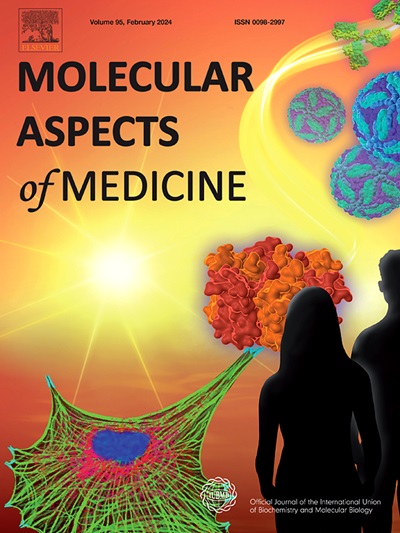解开炎症性肠病中营养-微生物群的联系
IF 10.3
2区 医学
Q1 BIOCHEMISTRY & MOLECULAR BIOLOGY
引用次数: 0
摘要
炎症性肠病(IBD)是一组影响胃肠道的慢性肠道炎症性疾病。除了肠道屏障功能受损和免疫过度激活外,IBD的一个常见特征是生态失调,其特征是某些厚壁菌门、杆菌门、放线菌门的菌株减少,而变形菌门和病原体增加。新出现的证据表明,饮食和营养依赖的肠道微生物群(GM)调节是IBD的发病因素和辅助治疗。目前,没有一种营养方案显示出普遍的功效,建议也存在争议,特别是那些涉及可能导致营养不良的限制性饮食的建议。本文综述了宏量营养素、饮食方案和转基因调节在IBD患者中的作用。西式饮食会导致粘膜对共生菌的异常免疫反应,损害肠道屏障的完整性,从而引发肠道炎症。相反,地中海营养模式似乎是最有益的饮食方案之一,能够通过促进益生菌和保护肠道屏障和免疫功能来恢复宿主肠道生理,从而形成良性循环,提高患者对这种模式的依从性。进一步的临床研究是有必要的,以证实目前的IBD营养指南,并开发更准确的模型,以推进精确营养和改善患者的生活质量。本文章由计算机程序翻译,如有差异,请以英文原文为准。
Disentangling the nutrition-microbiota liaison in inflammatory bowel disease
Inflammatory Bowel Disease (IBD) is a set of chronic intestinal inflammatory disorders affecting the gastrointestinal (GI) tract. Beside compromised intestinal barrier function and immune hyperactivation, a common IBD feature is dysbiosis, characterized by a reduction of some strains of Firmicutes, Bacteroidetes, Actinobacteria and an increase in Proteobacteria and pathobionts. Emerging evidence points to diet and nutrition-dependent gut microbiota (GM) modulation, as etiopathogenetic factors and adjuvant therapies in IBD. Currently, no nutritional regimen shows universal efficacy, and advice are controversial, especially those involving restrictive diets potentially resulting in malnutrition. This review provides an overview of the role of macronutrients, dietary protocols and GM modulation in IBD patients. A Western-like diet contributes to an aberrant mucosal immune response to commensal bacteria and impairment of the intestinal barrier integrity, thereby triggering intestinal inflammation. Conversely, a Mediterranean nutritional pattern appears to be one of the most beneficial dietetic regimens able to restore the host intestinal physiology, by promoting eubiosis and preserving the intestinal barrier and immune function, which in turn create a virtuous cycle improving patient adherence to the pattern. Further clinical studies are warranted, to corroborate current IBD nutritional guidelines, and develop more accurate models to move forward precision nutrition and ameliorate patients’ quality of life.
求助全文
通过发布文献求助,成功后即可免费获取论文全文。
去求助
来源期刊

Molecular Aspects of Medicine
医学-生化与分子生物学
CiteScore
18.20
自引率
0.00%
发文量
85
审稿时长
55 days
期刊介绍:
Molecular Aspects of Medicine is a review journal that serves as an official publication of the International Union of Biochemistry and Molecular Biology. It caters to physicians and biomedical scientists and aims to bridge the gap between these two fields. The journal encourages practicing clinical scientists to contribute by providing extended reviews on the molecular aspects of a specific medical field. These articles are written in a way that appeals to both doctors who may struggle with basic science and basic scientists who may have limited awareness of clinical practice issues. The journal covers a wide range of medical topics to showcase the molecular insights gained from basic science and highlight the challenging problems that medicine presents to the scientific community.
 求助内容:
求助内容: 应助结果提醒方式:
应助结果提醒方式:


